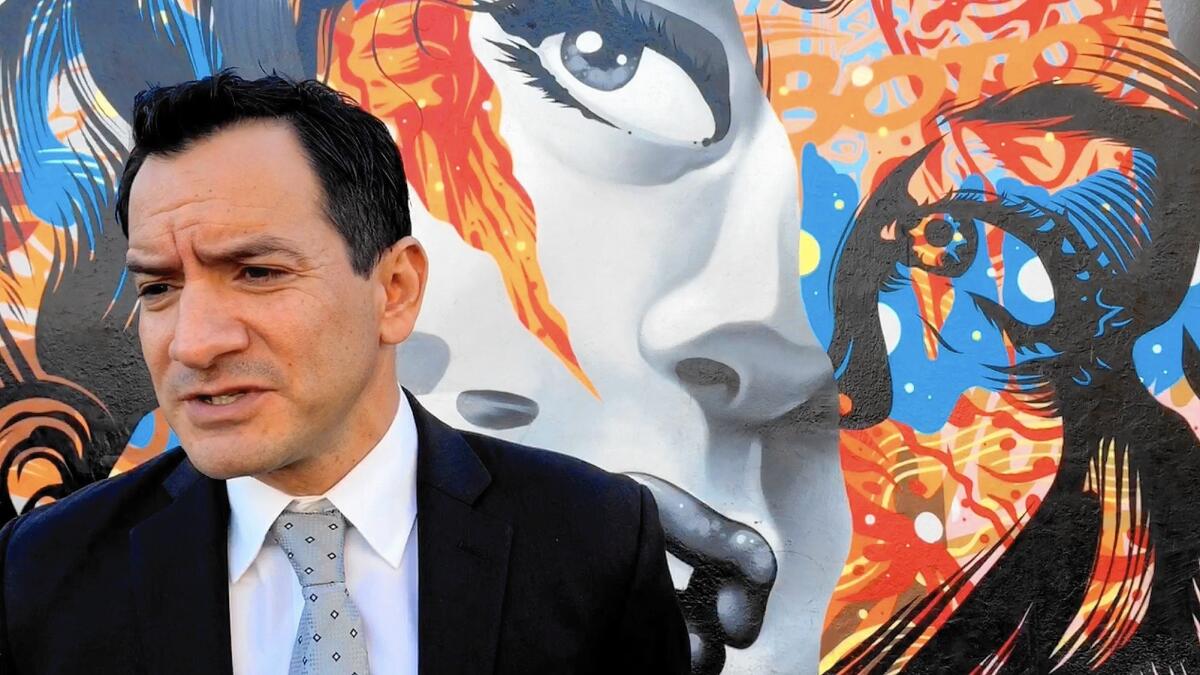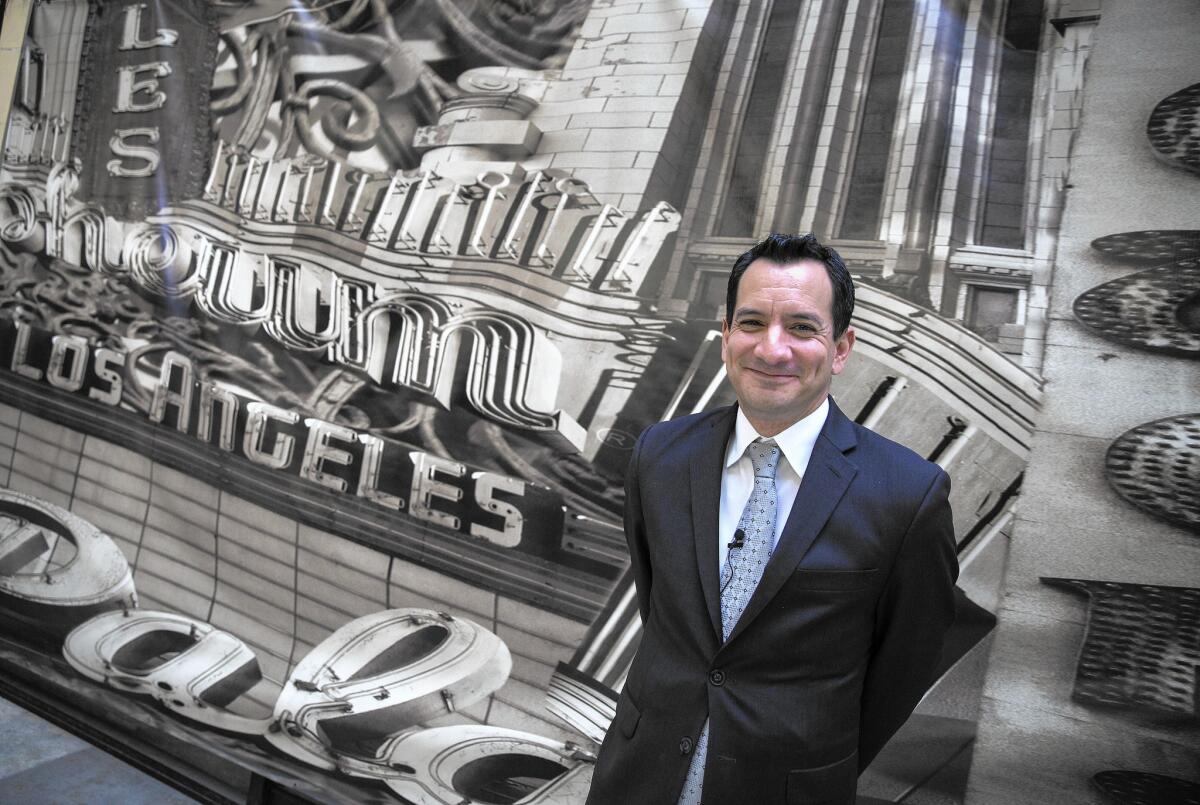Punk rock and Plato are touchstones for incoming Assembly speaker

Reporting from Sacramento — The philosophy section of the Last Bookstore in downtown Los Angeles is wedged in the back of the shop, but Anthony Rendon, a state assemblyman from Lakewood, had no trouble finding it.
“This is my little corner,” he said during a visit, navigating quickly through the store, a bibliophile’s paradise with dusty, used tomes and jazz playing over the speakers.
Here he’s surrounded by the thinkers who have captivated him ever since he stumbled into a community college introduction to philosophy course. It started with Plato, who in chapter one of “The Republic” asked a provocative question: What is justice?

On Monday, Anthony Rendon will be voted into one of the top political posts in California, the speaker of the Assembly.
“I never really cared about the circumference of a circle or who started the War of 1812,”Rendon said. “But if you’re asking what is justice or what is truth or what is beauty, that seems pretty important to me.”
He sounds more like a brainy graduate student than bare-knuckled politico; in fact, he said he resented having to learn about the nitty-gritty of elections. And yet, last fall, he won the approval of his Democratic colleagues to be their next leader. On Monday, he’ll be voted into one of the top political posts in California, the speaker of the Assembly.
When he officially takes over in March, he’ll have the potential to serve longer than any speaker in the last 20 years, thanks to recently expanded term limits. But the job also presents a cluster of political land mines.
To navigate that terrain, he’ll lean on the books in his little corner, especially Plato’s fundamental question of what is justice.
“If you’re not asking that question on a daily basis,” he said, “you’re not doing your job.”
::
Rendon’s lower-middle-class upbringing crisscrossed the Southland and its neighborhoods: he was born in Silver Lake, then moved to Montebello, Whittier and northern Orange County. His father held multiple jobs, including working for a mobile home company, and his mother was a teacher’s aide at a Catholic school.
His parents were ardent Democrats, but Rendon was mostly apathetic — politically and academically. He preferred playing soccer and listening to punk music to studying and at one time had a 0.83 grade-point average at California High School in Whittier.
After a string of low-paying jobs in warehouses, Rendon decided to enroll in Cerritos College. It was there that he found that philosophy course, which led him down an increasingly erudite path: a bachelor’s and master’s degree at Cal State Fullerton and eventually toward a doctorate in aesthetic and political theory from UC Riverside.
Philosophy held the same appeal to Rendon as the punk music he listened to in high school; it was about stripping the world down to the essential elements.
“That’s all punk rock is about — four chords … three minutes and it’s over,” Rendon said.
It also awakened a voracious appetite for reading, which is apparent in Rendon’s conversational style, jam-packed with references both lofty (Heidegger, Gandhi, Henry Miler) and grounded (Frank Zappa, the indie band Bright Eyes).
Early into dating his now-wife, Annie Lam, “we talked about Socrates, Aristotle — that’s just what he’s interested in,” Lam said, calling Rendon her “personal Wikipedia.”
After graduate school, he worked for a string of nonprofit organizations specializing in early childhood education and the environment. Suddenly, politics wasn’t just theoretical; it had concrete effects on his budgets, the people he could employ, the services he could provide. That realization was particularly acute during the recession.
“The cuts that he was looking at to the workforce, it just pained him to no end,” said James Johnson, a longtime friend and Los Angeles-based labor organizer.
Rendon also dabbled in political campaigns and ultimately decided to jump into the fray himself. He ran for Assembly in 2012 and won. It was his first elected office.
::
Rendon, 47, does not come across as an overt political animal. He says others call him an “alien” for never having seen an episode of “The West Wing” or “House of Cards.” He appears determined not to be in the spotlight and he is perpetually slouching, with his arms crossed.

Anthony Rendon, the incoming speaker of the Assembly, held a series of low-paying jobs until enrolling in Cerritos College. It was there that he discovered philosophy. That led him to earning undergraduate, master’s and doctorate degrees.
“He draws attention to himself by not drawing attention to himself,” said former Assembly Speaker John A. Pérez, who has known Rendon for a dozen years. “He’s not outsized. He just is.”
But early in his first term, he charged into a high-profile and politically thorny issue: water. He took the lead in crafting the $7.5-billion water bond approved by voters in 2014. But his deliberate approach — which involved scores of hearings across the state and an aversion to earmarks for local water projects that in the past were used to win legislators’ votes — bothered some Democrats, who sought to marginalize him from the process.
Negotiations turned tense. Former Assemblyman Henry Perea (D-Fresno) recalled one phone conversation just weeks before the deadline to craft the bond. Perea wanted more money for dams and reservoirs to satisfy the agricultural interests in his district. Environmentalists like Rendon despised such storage projects. The call devolved into a shouting match.
But the compromise that was ultimately forged — $2.7 billion for water storage projects — was crucial to the final bond. Rendon remained lead author of the legislation, and Perea became one of his biggest boosters for speaker.
“After our dust-ups, we were able to sit down, have a beer, talk it through and not let the emotional side of this job get in front of legislating,” Perea said. “He’s good at being able to cut through the noise and sit down and figure out what interests people really have.”
Rendon’s time in Sacramento coincides with a moment of enormous transition in the Capitol. He was part of the first class of legislators elected under longer term limits that enable tenures of up to 12 years in either chamber.
After two decades of constant turnover among legislators, this new group saw themselves as relative long-timers, eager to wrest power back from the staffers and lobbyists who had accumulated more know-how and influence than most lawmakers.
Rendon unsuccessfully ran for speaker in 2013, losing to current Speaker Toni Atkins (D-San Diego). In his bid to succeed her, he tapped into the newer lawmakers’ ambitions, promising to decentralize power from the speaker’s office and give individual members more autonomy.
“He was the only one I felt cared about the institution,” said Assemblyman Ian Calderon (D-Whittier), one of his top allies. Rendon’s pitch, Calderon said, was about “empowering members to do the work rather than always relying on the staff.”
Rendon is not termed out until 2024, so he could potentially serve as speaker for eight years. That would be the longest tenure since Willie Brown led the chamber for 15 years beginning in the early 1980s.
The possibility of a longer leadership term can be tantalizing: more time to pursue big policy goals, the consolidation of more political power. But that power could be precarious. Political rivals may be willing to wait out a leader they dislike for a year or two, but they may be inclined toward insurrection in the face of a possible longer-term speaker.
“The downside is, in this new world, there is the potential for members to be less patient and less forgiving in moments of disagreement and frustration,” Pérez said.
There are also ideological rifts within the Democratic caucus. Such fissures between liberal and self-described “moderate Democrats” have existed for some time, but they escalated last year when the two sides clashed over climate change legislation.
Rendon is a liberal — he proudly notes he has among the lowest scores on the California Chamber of Commerce’s “best business votes” report card. But business-aligned Democrats were pivotal in vaulting him to the speakership, a political alliance that made some on the left suspicious.
He knows he is being closely watched by labor and environmental groups to see how his ties to these self-described moderate Democrats may shape his tenure.
“I will disappoint them,” Rendon concedes. “But ultimately, I think they’d rather have me in that office than not in that office.”
Does that pragmatic streak run counter to Rendon’s high-mindedness? No, he said, returning to the philosophical questions that animate him.
“The question is very basic: what is right and what is wrong?” he said. “But the answer is really hard.”
Twitter: @melmason
Sign up for our daily Essential Politics newsletter
ALSO:
California milestone: 2 top legislative leaders will be Latino for first time
Skelton: Rendon aims to focus on education
Brown again preaches prudence in state budget
Budget reflects Brown is sour on ballot initiatives
Follow along with live updates from Sacramento
More to Read
Sign up for Essential California
The most important California stories and recommendations in your inbox every morning.
You may occasionally receive promotional content from the Los Angeles Times.











